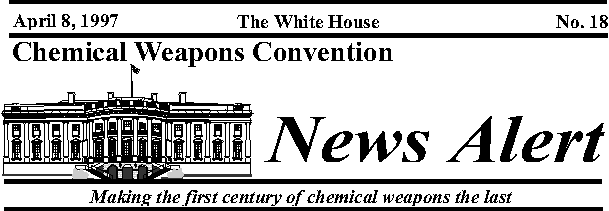The Chemical Weapons Convention has been before the Senate
since November 1993. Over the past three and a half years, the
Senate has held 13 hearings on the treaty, and the Senate Foreign
Relations Committee has scheduled three more hearings this week. The
Administration has conducted dozens of briefings for Senators and their
staff.
The Administration has also provided the Senate more than 1,500 pages of
information on the CWC -- over 300 pages of testimony, over 500 pages of answers
to letters and reports, over 400 pages of answers to questions for the record, and
over 300 pages of other documentation. In April 1996, the Senate Committee on Foreign
Relations voted the treaty out of Committee by a strong bipartisan majority, 13-5.
Despite this thorough scrutiny and debate, opponents continue to raise concerns about
the treaty. The News Alert will look at a series of facts, not the fictions, about
the Chemical Weapons Convention.
The Deadline Fiction: The April 29 deadline is of no consequence and is of the
Administration�s own making.
The Facts:
- In fact, April 29 is a real deadline with real consequences for America�s
security and American business.
- Our ability to oversee the first critical days and months of implementation
of the treaty will be lost -- Americans who now head up the divisions that monitor
the treaty�s budget, security measures and industry inspections will be replaced by
individuals from countries that have ratified the treaty. Moreover, Americans will
not be able to serve as inspectors.
- Hundreds of millions of dollars in sales by American chemical companies and many
jobs will be at risk as a result of mandatory trade restrictions originally designed
to pressure rogue states to join.
- And failure to ratify would relegate us to the back benches with international pariahs
such
|
as Libya and North Korea, squandering our international leadership in the fight against chemical weapons and weapons of mass destruction.
- Article XXI(2) of the treaty states: �For States whose instruments of ratification or
accession are deposited subsequent to the entry into force of this Convention,
[April 29, 1997] it shall enter into force on the 30th day following the date of deposit
of their instrument of ratification or accession.� That means that States ratifying after
April 29 will not have a vote at the treaty�s critical organizational meeting that begins
May 6, at which basic decisions regarding the budget, implementation and assignments
will be made.
The Pull Back Fiction: Last September, the Administration pulled the CWC back from
the Senate for fear it would unnecessarily burden U.S. industry.
The Facts:
- The treaty was put on hold in the midst of the presidential campaign because, as
Republican Senator Richard Lugar explained, �The whole process was politicized in a way
that would be harmful to our foreign policy. This is not a good time for the debate.�
- The leading trade and small business organizations support the CWC and say it will not
pose an undue burden on business.
The Pressure on Others to Ratify Fiction: To pressure the Senate, the Administration
encouraged other countries to approve the treaty and trigger entry into force.
The Facts:
- President Bush�s Secretary of State, Lawrence Eagleburger, signed the treaty in January
1993. The almost four years it took for the 65th ratification to trigger entry into
force on its face undercuts any claim this inevitable moment of truth was rushed.
Tomorrow: The Cost Fiction |


